Ellen and Jim Have a Blog, Too
We are two part-time academics. Ellen teaches in the English department and Jim in the IT program at George Mason University.


The 1996 McGrath _Emma_ & 2008 Hughes _Miss Austen Regrets_ · 24 May 08
Gentle readers,
On this beautiful May evening I thought I would offer up assessments of two Austen films. First, via a link to Jane Austen’s World, my review of recent 2008 BBC/WBGH Miss Austen Regrets, produced by Anne Pivecvic. written by Gwyneth Hughes, directed by Jeremy Lovering, produced by Ann Pivevcic starrring Olivia Williams, Greta Scacchi1.
Second, some notes towards a chapter on the Emma movies that I took on the superlatively intelligent & nuanced 1996 Miramax Emma, directed & written by Douglas McGrath, produced by Patrick Cassavetti & Steven Haft, & starring Gwyneth Paltrow and Jeremy Northam. I know I’ve written about this particular Emma before on this blog, but now I’m thinking I didn’t begin to be adequate about it.
For a start, I said it was very like the 1996 Meridian/A&E Emma (written by Andrew Davies, directed by Diarmiud Lawrence, produced by Sue Birtwistle). No two films of Emma who stick to the keeping the central characters, crucial events, plot-design, and famous lines of the original or first book (as they both do), could be more unalike. McGrath’s Emma is a moving fairy tale, an attempt at presenting a feminine point of view by a man, a movie which exonerates Emma herself as an innocent well-meaning child (rather like Mr Woodhouse is presented in the film); Davies’ Emma attempts to improve Austen’s Emma by a social critique; Emma is tamed and taught to control her egoistic vicarious fantasies by a impatient driving man, Knightley, and Harriet is saved by a tender protective one, Mr Martin.
McGrath’s 1996 Miramax Emma functions for me the way the 2008 WBGH/BBC Sense and Sensibility (also written by Andrew Davies, but directed by John Alexander, & produced by Vanessa de Sousa and Anne Pivcevic). Both Austen movies demonstrate my definition of apparently faithful or transposition is inadequate and (if not intendedly so) misleading. As with the 2008 S&S what matters in the 1995 Miramax Emma is the enunciation: the sum total and details of artistic techniques, and in the movies, director intervention. This Miramax Emma follows line of book faithfully in scene coming after scene as in book, many foreshortened but not all. In fact Davies S&S is in many ways literally more faithful to Austen’s S&S than the Ang Lee/Thompson Miramax 1995 S&S: unlike Thompson, Davies includes Edward’s visit to Barton cottage, Willoughby’s confession scene to Elinor, the second dinner party where Elinor and Lucy meet Mrs Ferrars and a social scenes in the latter part of the novel which embody D. W. Harding’s idea that Austen wrote to release her outrage at the cruelties and hypocrisies of social life.
Here are some some scattered thoughts on the enunciation of the 1996 Mirama Emma. This Emma is explicitly made into a fairytale, with many of the stills fixed to resemble antique pictures from some romance you once read a long while ago. Everything about it in the framing announces hapiness, complaceny, oh how lovely is the universe, it’s woman’s film as delicate. As with the 1995 S&S, it has soft voices and lovely background music, outdoors scene set up to be artificially picturesque. The picnic photographed as a fete champetre.
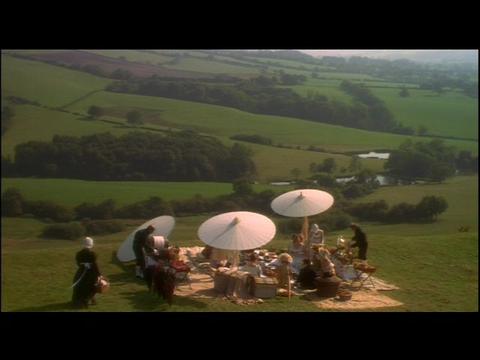
The dialogue is well-written, believable, representing a rewrite of Austen in modern terms which are not pop or vulgar (as the Austen movies of the ‘05 to ‘07 type sometimes fall into). The dialogue from Emma continually made more naturalistic and actually improved often—without deviating from meaning in text of specific dialogue (if overall effect different). McGrath’s carriage scene with Mr Elton is excellent. And long—much longer than Meridian/A&E Emma, as long perhaps as the Constanduros/Glenister BBC 1972 Emma (which is more updated and presents Elton as a man who thinks no means yes).
The proposal scene is brilliant, much rewritten from Austen, the best proposal scene in all the Austen films I’ve seen thus far. A great addition to Knightley’s proposal: “And the torture I assure you was acute.”
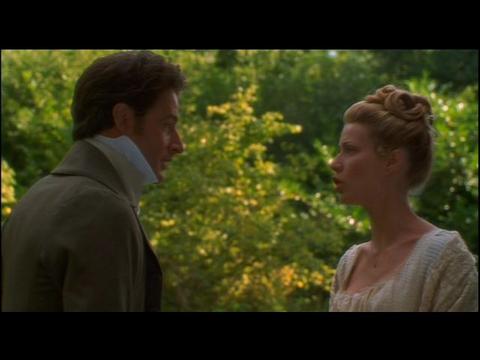
Mr Knightley (Jeremy Northam) attempting to speak to Emma (Gwyneth Paltrow) who stops him
The way Knightley says he was hurt because he thought Frank Churchill intended for Emma puts me in mind of how Wentworth led to feel Mr Elliot intended for Anne. McGrath has gone deep enough to reach Austen type archetypes so central to the pain of the books: you watch someone you love intended for someone else and are tabooed from speaking. In type Jeremy Northam is like the protective Ciarhan Hinds in the 1996 BBC Persuasion. The dialogue throughout is quick patter real talk throughout so that the language of Austen abbreviated and intemixed with just right moden words (most of the time, it flubs at the dance) makes the book feel alive in a new way.
The Americanness & naivete of it: Emma making over Harriet is very like Clueless (making her presentable); the sweetness of the tone reminds me of how some people have read Cranford (which is reflected in the recent film adaptation). The one real note of disquiet in McGrath’s Emma is Miss Bates—brilliantly conveyed against the grain of the whole piece by Sophie Thompson. Where after Emma’s insult of Miss Bates in the 1972 BBC Emma really apologizes to Miss Bates (who however is worried that Mr Frank Churchill has stopped showing up for Jane), and in Andrew Davies’ 1996 Emma she does talk to Miss Bates who sticks to Jane’s misery (about whom it makes sense since we have had so much more about Emma v Jane), in McGrath’s Emma, Emma is excluded by Miss Bates as causing her too much pain. Emma returns to her father’s house and behaves super-penitently before Mr. Knightley:
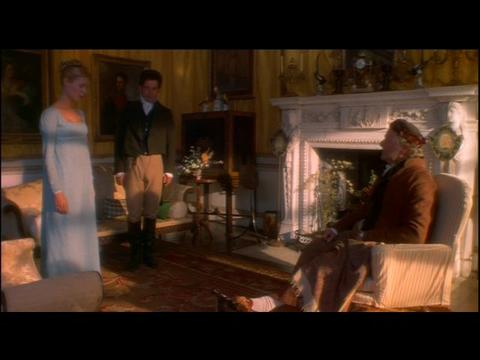
Emma contradicting her father and saying she is not a good person; she apologizes before Mr Knightley
McGrath’s is a movie about the education of Emma Woodhouse, only one aspect of which is some mortification.
Mr Knightley’s forgiveness then beautifully developed in a nuanced way and he kisses her hand (precisely what he does not in book). Later memory while she writes her diary gives us flashback of this (camera angles we didn’t get before) and him as tender loving protective gentle man. He is utterly kind and gallant to Miss Bates.
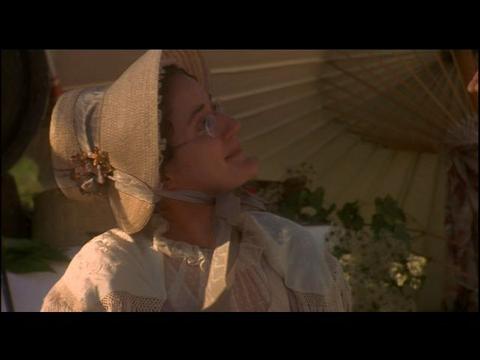
Miss Bates (Sophie Thompson) looking up to Mr Knightley who has asked her for the pleasure of her company after she has been humiliated. In this film Mr Knightley rescues Miss Bates too.
Thompson is a young nervous wreck, easily hurt and not knowing what to do with herself—and she, not Jane, becomes one of the young vulnerable women of the movie. It is she who flees Emma when Emma shows up. Polly Walker as Jane seems as duplicitious and calm as Ewan McGregor as Frank. There is an attempt to make Frank’s lying and duplicity ugly; Emma says Mr Knightley would never deceive a woman into thinking he loves her unless he really did, but since we don’t see enough of Frank, it’s hard to feel Emma was really ever hurt. Also she’s such a child.
As part of this lack of questioning, the movie brings Jane’s story to a swift closure early (Mrs Weston’s disclosure comes quickly) so as to leave time for Emma to do voice-over yet we are not to take too seriously her anguish. So much is left out in favor of things put in (diary entries for example, time) it is so very different – Jane segments just vanished. This movie centers on Emma and Harriet as much as Emma and Mr Knightley. There is a tendency in all the Emma movies to do this; some justice done to Jane through Miss Bates. Davies’ movie is so short, that at times it ends up a crude sliver in the sense of what is on offer so if Jane part bigger than Harriet not saying much and I’m not sure it is. On the other hand from the point of view of following the order of the scenes, this movies follows them more carefully than either the 72 or other 96 (A&E) Emmas!
Back to Emma herself: she’s really characterized as a child; like her father, she doesn’t want things to change. Emma is dressed like a child girl in contrast to the mature Jane:
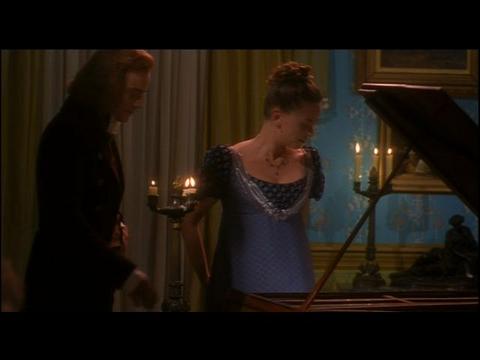
Jane (Polly Walker) preparing to sing, helped by Frank
The anorexic flat-chested frail look of Paltrow is harped upon by making Toni Collette (as Harriet) looker heavier. Most of all she is presented as always meaning well and never really hurting anyone. In Austen’s book, Emma is the one who tells the ugly and dangerous (to Jane Fairfax) story that Jane is in love with her friend’s husband and Mr Dixon returns this love. In the movie, the whole sordid fib is given to Frank. Emma is like a child who has been naughty when she goes to Mrs Weston after Mr Elton’s carriage incident; Mrs Weston the mother figure whose behavior to Emma paralllels Emma’s to Harriet. What different Emma as she learns her lesson and humbly kisses Harriet’s hand. Is this a different take than Austen’s?—and felt through enunciation. Yet at times the movie is much more like book that the 72 or 96 A&E Emma: in Austen’s book and this film Emma openly deplores Harriet’s love for Knightley, does not hide her first harsh (though gently said as the movie is gentle) reaction.
We are supposed to find her self-hypocrisy (she’ll say “I never read letters” when she’s been scouring them for an invitation to the Coles’s dinner party) endearing so probably the breaking of her laces as she walks with Elton and Harriet is also venial fib. The jokes about letters is like Cher in Amy Heckerling’s 1995 Clueless and then she has them hidden under her light shawl. One of the essays I’ve read on this Emma argues it is strongly influenced by Clueless.
In Austen’s novel a parallel is set up between Mrs Elton and Emma: as Emma patronizes Harriet, so Mrs Elton patronizes Jane. In this movie Mrs Elton is presented as beside the point, almost irrelevant except insofar as she irritates Emma; the parallel with Emma teaching Harriet is Mrs Weston teaching Emma. We get a wholly invented scene where Emma tells Mrs Weston of her love and Mrs Weston gives Emma precisely the advice Emma gave Harriet: let his behavior be your guide; you must wait; put him out of your mind.
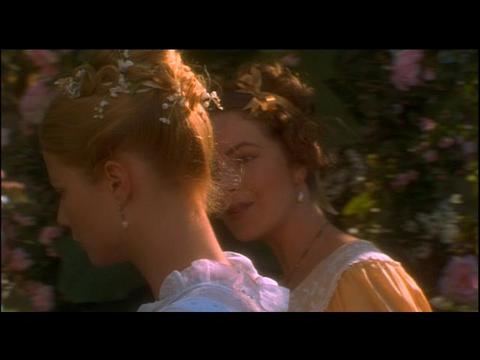
Mrs Weston (Gretta Scacchi) advising Emma after Emma has told Mrs W that Emma loves Mr Knightley
The thematic structure of book is thus wholly changed as in book the parallel is Emma/Mrs Elton, not Emma/Harriet with Mrs Weston taking Emma’s role towards Harriet towards Emma herself. Emma is anorexic and sweet and in the first meeting Mrs Elton is aggressive and implicitly menacing belligent; while she keeps interrupting Elton, he is also there instead of Harriet and in a still I catch he looks hostile too. No specific provocation for Mrs Elton’s insult of Mrs Weston: “I was astonished she was so lady-like” Juliet Stevenson as good as Fiona Walker, but in a different tune or mood so to speak. Stevenson is subtler and less sexy, her grating bullying and driven towards showing she has or had money, diminished because of distanced and kindly framing.
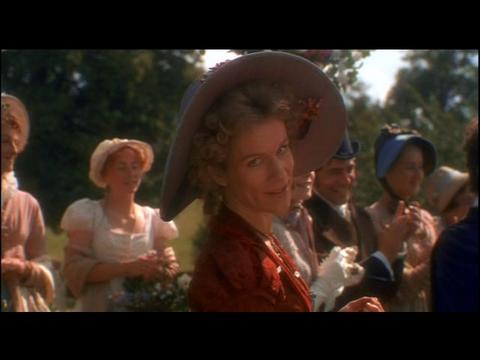
Mrs Elton (Juliet Stevenson) telling us there has been a shocking lack of satin at this affair
We also don’t see her with Jane in the way we do in the 1972 Emma.
Part of this sympathy for Emma centally comes from having Jeremy Northam play a Mr Knightley who allows his vulnerability to show through. I thought him brilliant though not Austens’s Mr Knightley (John Carson comes closest to this, a man who lives within himself and is strong and kind and sensible). The lines from the end of Austen’s proposal scene are used (for the first tie in the costumed Emmas), but transformed so that Mr Knightley presents himself as a sort of jealous Wentworth. In Austen’s Persuasion, Wentworth in part does and was meant to be made jealous by Mr Elliot, and persuaded that the Elliot family (particularly Lady Russell) meant to cut him out again. McGrath’s Mr Knightley says he did not befriend Frank because he saw the Westons wanted Frank for Emma’s husband. Northam’s Mr Knightley spends his life by Emma’s side, but not admitting to this; he allows her to dominate a scene; he dreads dancing; he allows Elton at the Weston’s Xmas party Elton to plumps himself between him and Emma (loving Emma we see, always near by): this is a love story of shy gentle man and childlike gentle egoistic child woman.
Through the stills this one does tease us to think there is something between Knightley and Jane. At dinner party in the 1972 BBC Emma, Knightley is very kind to wall-flower and then bullied Jane, but his interest is clearly not erotic (Carson is older), but genuinely empathetic; also Emma (Doran Goodwin) and Knightley combine to be kind to Jane (Ania Martin) after the humiliations of Mrs Elton’s (Fiona Walker) laughter at the idea Jane might have a lover, while in this 196 Miramax Emma, Emma sees Jane and Knightley smile at one another (especially him at her) and looks worried. This is also caricature at moments in comparison with 1972 BBC Emma when it comes to Mrs Weston and Frank’s relationship say: in the ‘72 film the psychologies are much more believable and thorough—with Mrs Weston saying she must like Frank. (By the way Paltrow’s Emma’s cloak for ball modelled on Emma’s cloak for Xmas in the 1972 film; the first one was lovely.)
The presentation of Frank as an arch playful gallant half-prepared to leave her in the river makes him playful, spontaneous. Frank therefore does not begin by playing a part, not lying genuinely himself. Emma is our Rebecca of Sunnybrook Farm who has gotten stuck in the mud. He wants not to help her for then he would have to account for being in Highbury a day early so he ends up flirting archly—and phonily if you’ve read the book, posturing if you’ve not.
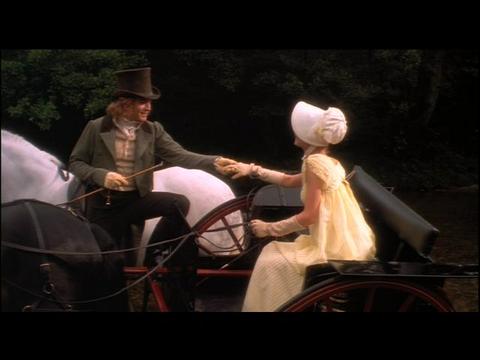
Frank (Ewan McGregor) now taking advantage of the awkward moment
The episode is called the awkward moment because Harriet retells to Emma how she met Mr Martin and his sister in a shop and how kind they were to her; it is also about how Frank came across Emma stuck in the river and how he wanted to avoid meeting anyone—why he started to go by, and then changed his mind as it would make more splash not to help. This movie does teach us that Austen’s Mr Knightley is conceived of as the opposite of Frank Churchill: not only a man who would treat a woman so unfeelingly as Frank (Mr Knightley says) but is the last man to make a woman believe he feels more than he really does. This is a bad sin in Austen: that’s how Willoughby seduced Eliza Williams in Sense and Sensibility.
These movies do come out repeatedly for a kind of lying Austen disapproves of. McGrath’s Emma actually says she does not know how “steady” a character Jane could be when she went along with Frank’s deceit, but when Mr Weston shows up to be reassured that Emma was not upset by his son, Emma pleases Mrs Weston by calling Mr Weston “the luckiest father in all of England.” In Austen such a statement would not be presented without saturnine tone and then by narrator. (Remember how all the burden of lying fell upon Elinor Dashwood). Then Mrs Weston is ecstatic, so women are to lie about such things to men? The movie does expose the lie but then nothing bad does happen to Harriet or Emma or even Jane. To no one we know in the movie does anything permanently newly bad happen (Miss Bates is no worse off for Emma’s insult), and Mrs Churchill’s illness presented as real. One problem that jarred in this movie but is found in the others (except perhaps at moments in the 1972 Emma) is Mr Weston is presented as fatuous, a middle-aged man to be so afraid of Emma, such an apparently sexless simpleton? I fear there’s a flaw in Austen’s presentation of middle-aged men except when they are absent fathers.
I particularly liked the use of voice-over and narration by Emma: this distanced us at the same time as a kind of gentle irony was set up so that we did laugh at Emma at the same time as we were not to take her or what we saw too seriously.
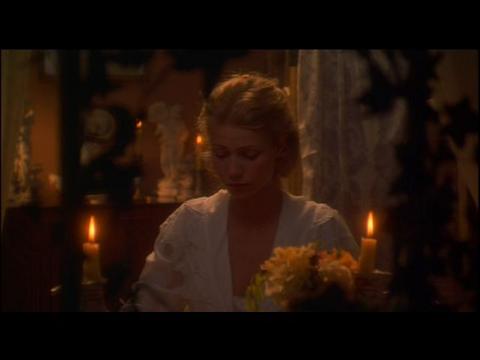
One of the many diary scenes towards the end of the film
It’s presented lightly, playfully, romantically that Emma cannot rid her mind of Mr Knightley, but it is a serious idea too: in other of Austen’s novels, the heroine has altogether too much time to feel the pain of loss of the beloved (Elinor Dashwood for example.) I should say in its use of ironies and centrality of Mr Knightley’s scenes with Emma it reminded me of the BBC 1972 Emma. Emma truly kept to the center in this one and everyone else much less. Paltrow is in just about all the scenes. the great moment of ball is Knightley and Emma dancing, and it’s brightly graceful at the same time as erotic; beside it all else pales. Jane is nowhere to be seen at the ball nor; the snubbing of Harriet is an incident in Knightley and Emma’s evening. Mr Knightley is shown to be shy and coming out to bloom with Harriet; Harriet’s pain emboldened him to dare dance with her first.
This is most unlike the 1972 which follows lines of book and develops them a little differently; or Davies’ 1996 where scolding and the hint of something odd in Knightley’s love for Emma becomes part of the last dance between them (which we do not see). (I have thought Mark Schorer’s point of view which so influenced Constanduros/Glenister in their 1972 BBC Emma that the book is about the humiliation of Emma Woodhouse is too strong. Austen’s Emma is not humiliated in the book; she’s too high in rank, too self-assured finally; rather she’s embarrassed and bothered and almost, she thinks, loses Mr Knightley.
So the closing voice over with swift succession of scenes of happiness is done in 1983 MP so here we have where this 1996 movie is anticipated by one of the longish transpositions of the previous crop. Again the female narrator and numbers of the dialogues reinforce a gentle combat going on between men and women in the film. The film does slide over Mr Woodhouse as an obstacle and burden and and our narrator (Mrs Weston’s voice or Gretta Scacchi) says he was entirely gratified (which in the end he was and business about chickens not believable in 72 except as an excuse for him to give in), they don’t over Harriet. Emma tells her directly and she flees crying. And Mr Knightley knows about this for in this film after Harriet flees the room, Mr Knightley appears and comforts Emma. But as it’s done in retrospective, as dumb show and with voice-overs we are distanced. And then Harriet emerges at the penultimate scene to say she always loved Mr Martin; even Emma’s fleeting superciliousness of expression cannot rob Toni Collette’s Harriet of her dignity here, especially when she says she decided not to see Emma again for a while:
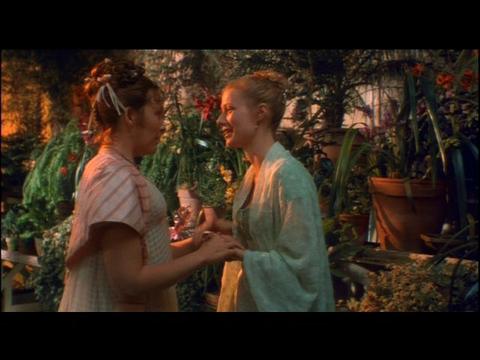
Collette shows more dignity than any of the Harriets of the four Emma scenes I’ve seen thus far).
This 1996 Emma is delightful even though I cannot for a moment believe in its unqualified sweetness—in just the way C.S. Lewis’s imagined landscape in The Allegory of Love is. Lewis says he finds nothing happier than to be eternally convalescent from some minor disease while sitting in a window seat overlooking a green landscape. It’s an artificial fairy tale beautifully well done.
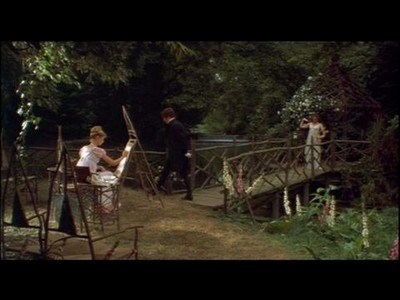
A typical picturesque moment: Emma painting Harriet with Mr Elton pacing nearby
It’s a cross between Cranford (with none of Austen’s acid) and Clueless (this Emma is really a sweet innocent Cher in pseudo-regency garb—sexed up) and the sets are pure heritage industry. If I’m now making it sound just awful, well it is in a way, but the acting and story are intelligent (they actually stick close to Austen for the story line, crucial events, famous lines now and again) and Sophie Thompson is just inimitable as Miss Bates), the script a remarkably persuasive modernization of Austen with real nuances of sensitivity. The lovely Christmas ball says it all for me: I’ve learnt to want to avoid Christmas as providing some of the most painful moments of my life and yet I know in dreams it is joyous and one keeps wanting joy and beauty.
By my old definition, it would be an apparently faithful type (transposition) as it follows the novel even chapter by chapter, but it is in tone and real feel, it is utterly unlike Austen’s Emma, an ironic book centered on a cool contained young woman, her dense self-centered father, and a lonely older good man (who is not as perceptive about eros as he is about most things).
To return to framing this as a diary entry, here in Alexandria, for the last three weeks ago Farmer’s Market in the center of town has come alive again. We have a town square with a fountain in the middle. All year long farmers and crafts people and artists come together to see their ware. It sort of dies in later November as there are only jewelry and pictures and crafts on sale, but it picks up again in later April and this week—this morning – Jim and I came home with grapes, a canteloupe, lovely oranges, new peaches, new small potatoes, three different kinds of greens for him to cook, cauliflower, eggplant, cherry and regular tomatoes, a fresh bread, not to omit a dozen eggs from our favorite egg man who has chickens who are free range and from whom I’d buy a turkey at Thanksgiving if I had anyone to cook one for. The place is lovely in the morning and this morning was very pretty in Alexandria, fresh dry air, sunny, only going up to the 70s today. The pastoral feel of this evening again, lovely and cool, the neighborhood looking so green, the sky so light blue and wide, everything so deliciously tranquil, prompted me to write about this film.
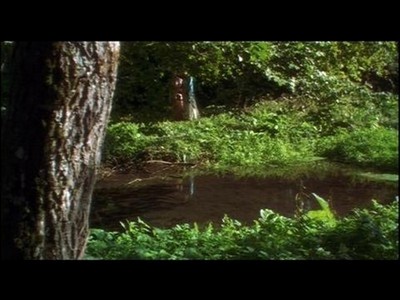
Emma and Harriet walking in a Highbury wood
Ellen
1 See Ms. Place’s review of Miss Austen Regrets; and my Aug 6, 2007 review of another “biopic” movie about Austen: the 2007 BBC Becoming Jane.
--
Posted by: Ellen
* * *
Comment
- To sum up:
I spent two and a half days this week carefully watching this movie. Despite its manifest un-Emma like qualities, and real flaws and irritations (complacency, a Hallmark Hall card and shop window as a movie), I’ve liked it from the first time I saw it. Then the proposal scene brought tears to my eyes. Now I think it has an even better script than Heckerling’s Clueless. I didn’t realize it had gotten some prizes the year it was screened in movie-houses. It seems to me a shame that Davies’s Emma rather than McGrath’s is the one that has become the familiar one due to TV watching; this is more sensitive, thorough, and intelligent, and even more understanding and sympathetic to aspects of Austen’s texts (the feminine world, the importance of gossip, cruelties of lies, bullying, & interfering in other people's lives); it also interests me as a commentary which is at the same time very close to Austen’s text literally (it follows the chapter line, includes crucial events, famous lines, all the major characters and so on).
This is why I’ve written a blog on it as well as finding something to do last night when I knew I could not read and needed to keep my mind busy. Pray pardon the lack of an orderly argument and the repetitions.
Ellen
— Elinor May 25, 6:19am # - Vic:
“I just read your post on Emma this morning. Ironically, Clueless is on TNT as I type. I love Amy Heckerling’s version of Emma above all the others, and while I agree that McGrath’s Emma is lovely, I have become a great fan of the Andrew Davies version. This is ironic, since I generally dislike how Davies sexes up Jane’s plots.”
— Elinor May 25, 5:48pm # - On Miss Austen Regrets
"Great essay, and it looks superb with pictures."
And on the farmer's market:
“Yummy, can I come to dinner? Sounds rather like the farmer’s market we have in Torquay, although I prefer the one in Totnes, about 8 miles away. Totnes is a medieval town, complete with Castle & walls, so the market is ancient. There’s a co-op that sells the best bread ever.
Clare”
— Elinor May 25, 5:48pm # - Dear Clare,
Our farmer’s market in Old Town is a probably common place phenomena around the US: I’ve come across them in small towns, middling cities and there is at least one large one in NYC every Saturday morning in Union Park, off 14th Street and a smaller one right near Lincoln Center around 74th Street off Amsterdam Avenue. Rows and rows of wooden stands filled with fresh goods, fruit, vegetables, home-made stuff, also clothes, jewelry, painting, flowers.
It’s not just locally grown food, and there are simply stands for people selling wares they also have a store for, but the atmosphere is so pleasant—especially early in the morning when I feel there is less tension in faces—and there is an emphasis on real food (recognizably food), naturally grown. The egg man has free range chickens. As the summer progresses we do get a lot of locally produced fruit and vegetables.
It’s a cheering thing to do of a Saturday morning. Old Town itself is a picturesque place, zoned in the 1950s to prevent high rise and egregious exploitative development, rules include no neon signs on stores; it was founded in the 18th century: not to romanticize it was a slave trading town and banking (Scots people in origin as far as the whites are concerned); then in the 19th century the river (Potomac) made it a central trading place of another kind. It has long period of decline from the civil war on, but as of the 1950s-60s it’s thriven and is now expensive to live in in parts—it’s very well located for jobs, trains, DC, libraries (what I look for).
Ellen
— Elinor May 26, 7:59am # - From Nancy M (listowner/moderator of Janeites):
“How accurate is the film? Not very, I would say. Judging by the letters of Miss Jane Austen which survive, I would say she did not regret her decision not to marry. That is not to say, she might not have had dreams of her own personal Darcy or Wentworth—a Wentworth who went to sea would give her time to write as well. But a vague longing for what might have been is not regret, and there is no proof of even a vague longing.
What I objected to in the movie was the picture of Jane Austen as a 19th century career woman, with her glass of wine, and the period’s equivalent of cocktail parties. How often is she surrounded by males with no females She also looks the more sophisticated career woman in contrast to Cassandra who was presented as more drab than Harriet Smith living in worse circumstances than Robert Martin.
On the other hand, the efforts to turn Jane into a saint are equally offensive.
Nancy”
— Elinor May 26, 11:30am # - Kathryn Sutherland gives a very positive review of Miss Austen Regrets in the April 25, 2008 issue of TLS, p. 18. I can’t find it online (perhaps someone else more able in this way can?). It’s worth reading even if you disagree with her views. She does not examine the film with respect to its literal adherence to what we find in the letters but rather as a film, and as a general take on Austen’s character and life—which she finds more adult than usual in biopic films (such as Becoming Jane). She calls it “a bleak and beautiful film whch dervies its eloquence from the intelligent complicity beween Hughes’s screenplay, Jeremy Lovering’s direction and Williams’s taut performance.”
I wonder to myself (I mean to resee it soon) how much Olivia Williams’s type, her psychological baggage from film to film, which also led to her playing the part of Jane Fairfax in the 96 Emma plays a part in Sutnerland’s delighted response to seeing Austen anew. Williams was also the betrayed wife in the film adaptation of Rosamond Lehmann’s Echoing Grove (the film had another title, something with the word “heart” with the hero, Paul Bettany and other woman, the heroine’s sister, Helena Bonham Carter).
Ellen
— Elinor May 26, 11:31am # - Laura Carroll’s review in an Australian literary magazine, Meanjin (“Abandoned Romance”), about both the recent biopics is a persuasive rebutal of Kathryn Sutherland's review of Miss Austen Regrets.
On Janeites Ms Carroll discussed these films “appalling insistence that Austen was a person who was thwarted, unsatisfied, and a compromiser. I can’t get my head around the idea that the artist who wrote Emma is someone who we should be taught to think of as beset by unfulfilled longings,” and went on to say:
“I take Nancy’s point about the drinking, but it didn’t bother me much at the time, quite possibly because alcohol drinking is such a central part of Australian culture that I find it hard to notice when it’s implausibly overstated, unless someone points it out for me.
On the issue of historical accuracy in Miss Austen Regrets, I think Ellen is right that in the first instance the answer there depends on how you interpret the letters and what you think they mean in the aggregate. Although, to qualify this, I did think that the film was often displaying a sort of technical fidelity to the letters while doing a distortingly strong reading of their spirit. The strange scene where Jane is made to appear jealous of Dr Haden’s attentions to Fanny K is one example.
I suppose that my biggest objection to the movie is more basic than agreeing or disagreeing with how it dramatised events told about in letters and the family histories. It’s more that I am sad that filmmakers can’t find themselves sufficient drama in telling the story of Austen’s creative life.”
— Elinor May 26, 11:36am # - From Clare:
“Sounds much like ours, but the one in Totnes is a little hippy, with lots of “arty” clothes and crystals etc. as well as he usual locally produced food… After years of markets closing because of the growth of the dreaded supermarket, they’re on the resurgence. People are increasingly looking for local produce, and people are more aware of the damage done to small town shops by the out of town supermarkets.”
Clare
— Elinor May 26, 9:47pm # - From Nick:
"Your article on Miss Austen Regrets looks great on that blog incidentally. I meant to remark on an
article by David Baddiel in the weeks Times’ books and this has reminded me. It is at…
"David Baddiel wonders what Dr Who would make of Jane Austen" http://entertainment.timesonline.co.uk/tol/
arts_and_entertainment/books/article3986793.ece
— Elinor May 27, 1:36pm #
commenting closed for this article
